A Tampa Bay area morning TV show kicked off National School Choice Week by highlighting a family who benefits from a state K-12 scholarship.

Arielle Frett appeared on Fox 13’s “Good Day Tampa Bay” program on Monday with her son, AnyJah, a ninth grader at The Way Christian Academy in Tampa. She said she moved to Florida from St. Thomas, Virgin Islands, in 2017 to find better educational opportunities for AnyJah, who has severe autism.
“No teachers were able to work with him on his level,” Frett told Fox 13 reporter Heather Healy. “Most of his learning in English and math are on fifth and sixth grade levels now.”
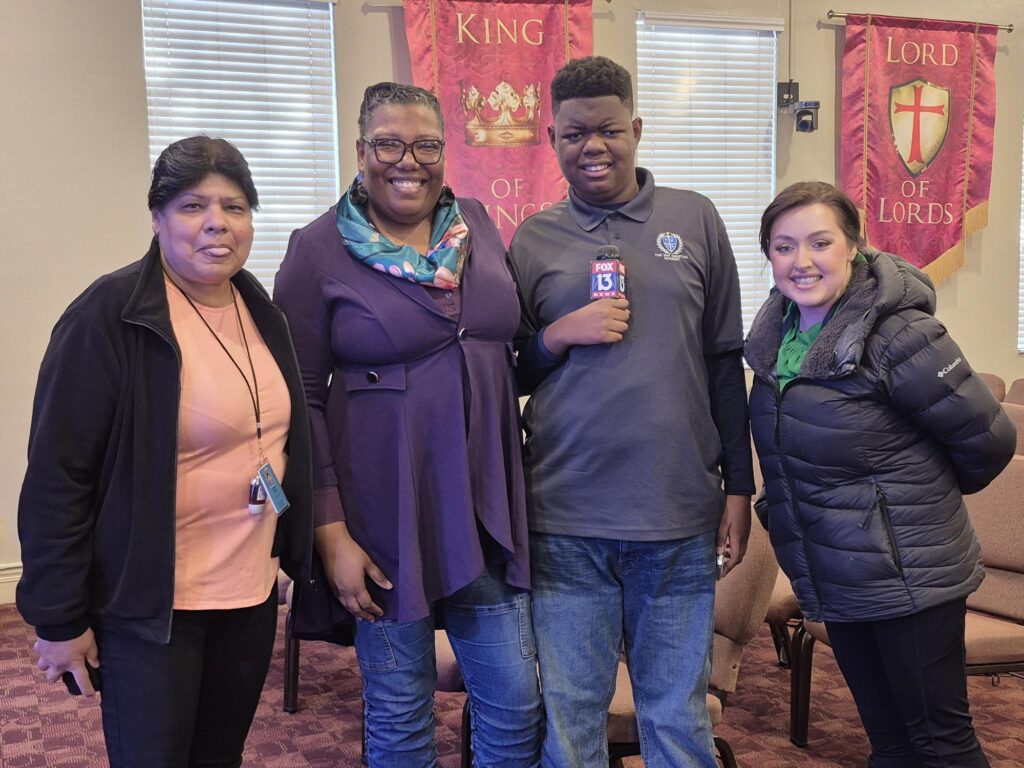
A U.S. military veteran and single mother of two, Frett said she would not have been able to afford a private school for her son without the scholarship.
She said AnyJah, who receives the Family Empowerment Scholarship for students with Unique Abilities, is “loved, protected, and thriving” at his school, where class sizes of 10 to 12 students allow for more individual attention. He can also receive his therapies during school.
The segment also featured information about Florida’s robust education choice options. Those include traditional public schools, district magnet schools, charter schools, private schools, microschools, homeschools, virtual schools, and customized education programs that allow parents to mix and match.
“We’ve gone from education and funding through the system to now empowering families by putting the money in their hands and allowing them to make the most appropriate educational decisions for families,” said Keith Jacobs, director of provider development at Step Up For Students, which administers most of the state’s education choice scholarships.
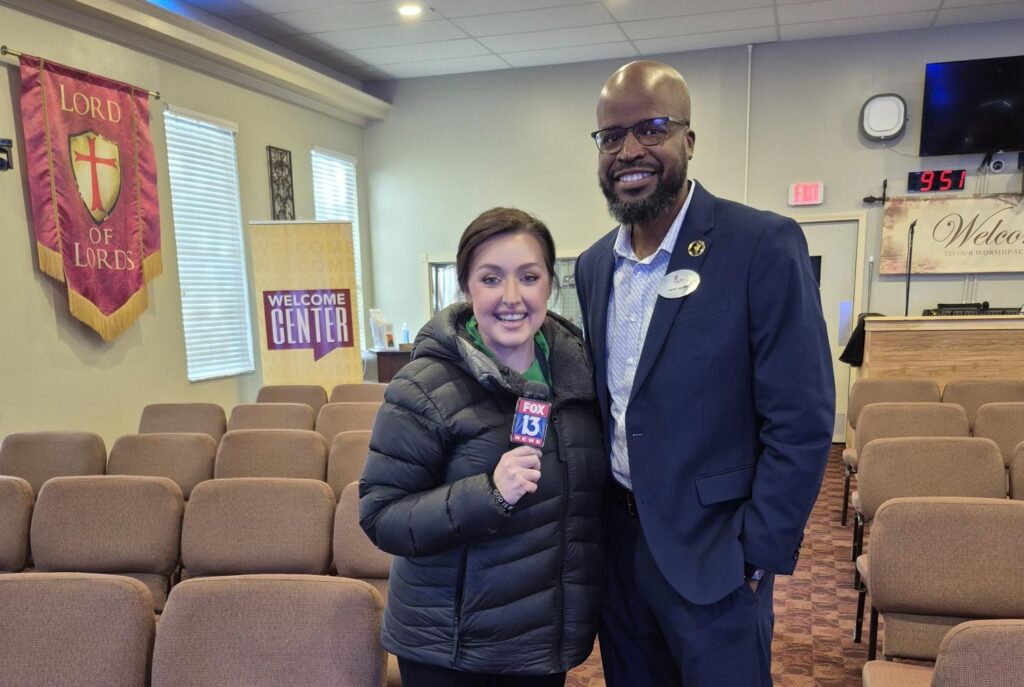
Jacobs has spent the past year working with school districts to provide individual courses to scholarship families whose students do not attend public or private school full time, paid for with scholarship funds. About 70% of Florida school districts are participating.
The scholarship application season for the 2026-27 school year begins Feb. 1. Visit Step Up For Students to learn more and apply.
Markala was Marlena and John Roland’s first child, and there were more on the way – four more, in all. And Markala was 5, so the Roland children were going to reach school age in quick succession.
This presented a dilemma.
“We wanted our kids in private school, but we didn’t have the money,” Marlena said.
But there was hope.
The year was 2005, and Marlena, a teacher at a private school near their Coral Springs home at the time, learned about a private school scholarship that had been established a few years earlier and was managed by Step Up For Students.

For nearly 20 years, a member of the Roland family attended a private school with the help of a scholarship managed by Step Up For Students.
She applied and was accepted, and for nearly all of the next 20 years, at least one of the Roland children attended a private school with the help of a Step Up scholarship. The exception was the two years the family lived in Georgia.
“It was a blessing for us,” John said. “The best thing we did was give them that education foundation.”
“None of that would have been possible without the scholarship,” Markala said.
Marlena was a teacher at ALCA when the kids began school. Even with the employee discount, she said the cost of tuition would strain the family’s finances. Still, she wanted her children to benefit from ALCA’s educational setting just like the students she was teaching.
“We wanted to set the bar high, to create good study skills and habits. We wanted them to be well-rounded,” said Marlena, who also taught at The Randazzo School for nearly 10 years, including the time Marcia attended.
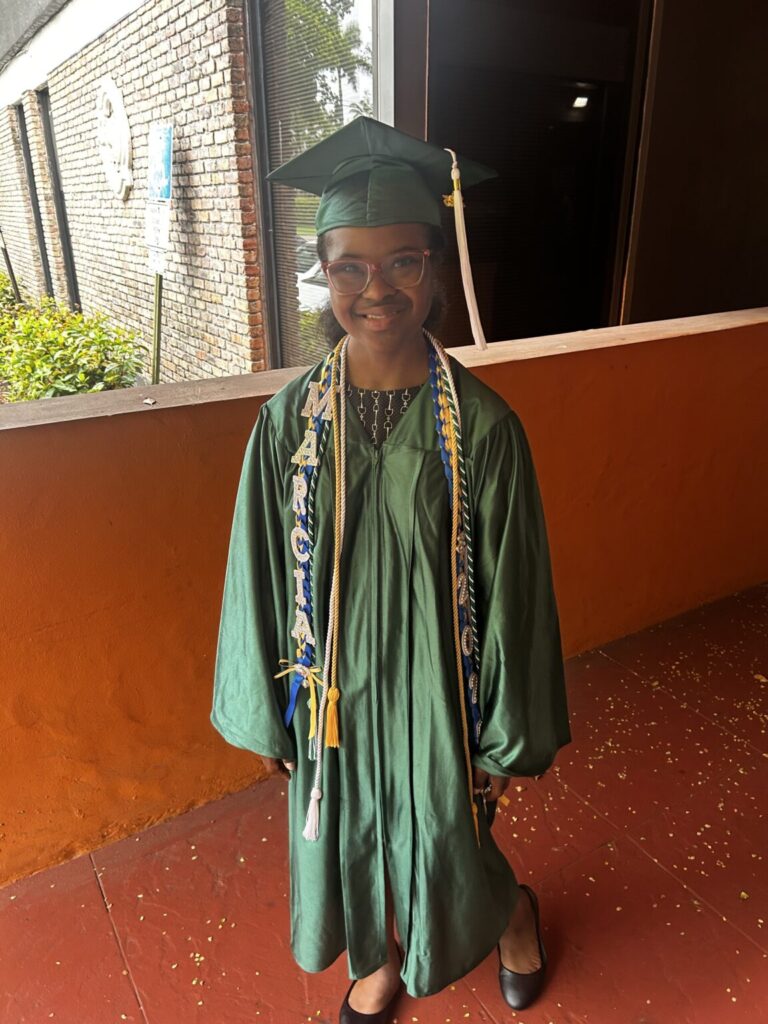
Marcia, who graduated last May from The Randazzo School, was the last of the Roland children to use a scholarship managed by Step Up For Students.
It was by design that the Roland children split their education between private and district schools. Some were sports-related, but mostly, John wanted their children to experience both educational settings.
“John said, ‘Let’s put them in public school for a little bit and see how it goes,’” Marlena said. “He said they need to have both, and that will build character and build them as individuals.”
And it worked.
The private school experience helped the children excel at their district schools.
“It laid a really good foundation for us,” Markala said. “Just getting us excited to be in the classroom, to learn new things, to collaborate with others.
“I had friends (in high school) ask me, ‘Where did you learn this? Why are you thinking that way?’ All I could say was, ‘Thanks to my teachers at ALCA and Westminster.’ They really set us apart and prepared us for what was coming next. We were leaps and bounds ahead of our peers.”
John credited the private school education his children received but also gave credit to the emphasis he and Marlena placed on education at home.
“When I dropped them off at school, I told them we’ll add to it when you get home,” he said.
“They didn’t play with that,” Markala said. “That was non-negotiable in our house.”
She remembers a time when John sold the family pickup truck to help meet the expenses of her attending Westminster that the scholarship didn’t cover.
“As a kid, you see them doing that, and I'm like, ‘Don't we need that car to get places?’ They really valued education. That was what was important,” she said. “I see that now as an adult, the things that they're willing to do to make sure that we had a good education, putting us into spaces where we could learn and grow have been tremendous to me, even now that I’m in the workforce.”
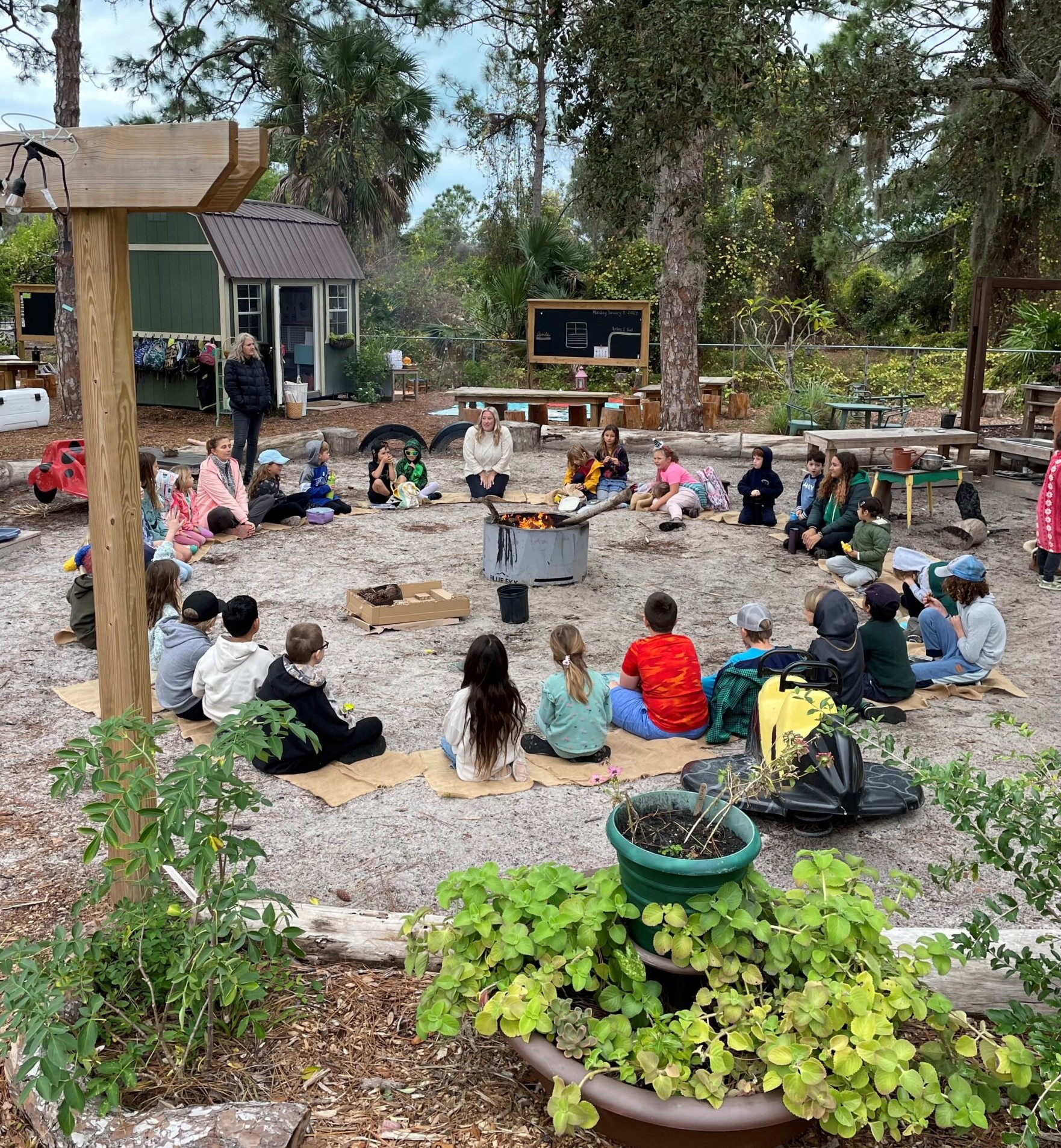
Roots Academy in Sarasota lets students spend much of their time outdoors to learn amid nature while still offering a rigorous core academic program. Photo courtesy of Roots Academy
SARASOTA, Fla. – When Briana Santoro and her family moved to Florida in 2021, she set out to find the perfect school for her two young sons. She wanted a school that would be nature immersed, Montessori influenced, and academically rigorous. She found good ones that offered pieces of what she wanted, but none that put the whole puzzle together. So Santoro did what an accelerating movement of education entrepreneurs, including parents, are now doing all over Florida:
She created her own school.
“I just got to the point where I thought, ‘I’m going to solve my own problem,’” said Santoro, who has a background in business strategy consulting.
Roots Nature and Leadership Academy bills itself as “thoughtfully rooted in nature.” It serves 60 students in grades Pre-K through six, up from 25 when it opened two years ago. Nearly all of them use state-supported choice scholarships.
Santoro’s detailed vision includes fully engaged citizens.
As the second half of the school’s name suggests, creating future leaders is mission critical. There’s a big emphasis on problem solving, emotional intelligence, and entrepreneurship. From the earliest ages, the students literally get their hands dirty working on sophisticated science projects that touch on some of the most pressing environmental challenges.
First- and second graders recently learned how monoculture lawns and pesticides hurt pollinators, then created informational brochures and wildflower seed packets to hand out in their neighborhoods. Third- and fourth graders studied regenerative farming, then got a demonstration from scientists, via Zoom, on how soil samples can reveal the chemical differences between organic and inorganic approaches. Fifth- and sixth graders, meanwhile, learned how to make a vermiculture composter from a University of Florida extension agent, then shared their knowledge in a presentation to a community group.
“They’re learning skills that are going to be incredibly useful in how they live their lives,” Santoro said. “Appreciation for nature is going to set this generation up to solve the problems we’ve created.”
Roots rents space from a church. It has multi-age classrooms devoted to music, yoga, and projects. But clearly, its heart isn’t inside.
Santoro was inspired by Richard Louv’s “Last Child in the Woods: Saving Our Children from Nature-Deficit Disorder.” She wanted to ensure her school honored children and “the essence of their childhood.”
To that end, the students spend 70 percent of their time outdoors, either on a whimsical campus where poodle chickens strut and peck under oaks and pines and a dozen varieties of fruit trees, or in an adjacent pine forest where they build forts, track animals, and otherwise range free for hours at a pop.
This is going to sound too good to be true, but bald eagles built a nest nearby and are frequently visible to students going about their day.
“The school is magical,” said Sarah Love, whose sons Harper, 9, and Carey, 12, attend Roots. “Children are laughing while butterflies are flying, and eagles are soaring overhead. I see kids learning academics while they’re on a mat on the ground with the sun shining on them. It just fills my heart.”
The school’s nature-inspired learning opportunities don’t end there.
Roots includes a “hen hotel” the students maintain themselves; learning “barns” full of Montessori materials the students use outside; and plans for a “special skills area” that will include everything from pottery and woodworking equipment to an outdoor fire cooking kitchen.
Gardening and archery are part of the curriculum. So are deep lessons about “gut health.” Beekeeping is on the horizon.
“They’re going to be better citizens if they know how to grow their own food, if they know how to care for the planet,” Santoro said.
Roots is as good an example as any to highlight one of the most underappreciated story lines to emerge as education choice has become the new normal in Florida:
Choice offers something for everyone.
This year, more than 500,000 students are using choice scholarships in Florida. As more and more parents signal their preferences for learning options, and more schools and other education providers emerge to serve them, more families and educators alike are realizing they can have exactly what they want. The evolving education landscape is increasingly dynamic and diverse.
By 2026, Roots expects to serve 75 students in Pre-K through eighth grade. In the meantime, it has 30 students on a wait list.
“Education is changing drastically,” Santoro said. “There’s a freedom of expression in education that’s never been there before.”
Santoro grew up in Canada. After a successful stint in business consulting, she went back to school to study nutrition. She became a certified nutritional practitioner, wrote a best-selling cookbook, and co-founded a company that specialized in high-end food supplements for kids.
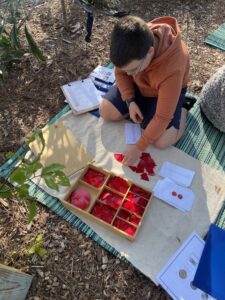 With Roots, she wanted not only a top-notch program, but one that could be accessible to families regardless of income and could pay teachers well so she could attract the best.
With Roots, she wanted not only a top-notch program, but one that could be accessible to families regardless of income and could pay teachers well so she could attract the best.
The Roots staff is eclectic, talented, and all in on the mission. Several formerly taught in public schools.
On the school’s website, one of the teachers quotes famed environmental writer Rachel Carson. Another notes she was raised in a family of environmental activists who traveled the world with iconic oceanographer Jacques Cousteau. Yet another embraced organic farming and permaculture while living in Thailand.
“I was looking at, who is going to be breathing life into my children?” Santoro said. “If children don’t have a deep compassion for the earth … it’s just not sustainable. What better way to teach that than to live it every day?”
Parent Corbyn Grieco said there is a lot more going on at Roots than green vibes.
Her daughter is climbing trees, building pollinator gardens, and making homemade elderberry syrup. But the school also focuses on core academic standards, Grieco said, and constantly communicating with parents about how their kids are faring with them. Her daughter is reading several grades above grade level and digesting serious knowledge about health, science, and business development.
That’s the sweet spot, Grieco said: Roots is able to achieve academic success while honoring the magic of childhood.
“To this day,” she said, Roots “is the greatest choice we’ve ever made.”
SARASOTA, Fla. — It was time for the valedictorian to address the assembly, so Emma Howey rose from her seat in the front row of the auditorium, left her walker behind, and, with the help of her favorite teacher, made her way to the edge of the stage.
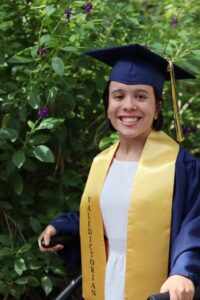 “I can’t believe I’m doing this,” she remembered thinking last May as she graduated from CES Academy of Bradenton.
“I can’t believe I’m doing this,” she remembered thinking last May as she graduated from CES Academy of Bradenton.
Emma was born with cerebral palsy and has used a walker since she was 3. But, two years earlier, at the end of her sophomore year, Emma set a goal of walking across the stage at graduation.
Emma’s only concession was that CES Academy teacher Charlie Stephenson would walk beside her holding her hand to help her balance. The rest would be all Emma, the result of 24 months of carefully planned occupational and physical therapy.
Also, determination.
And grit.
Emma’s walk of a lifetime required her to climb the six steps to the stage, turn left, and then walk 25 steps to the podium.
“I gotta do this,” she remembered thinking when she reached the foot of the staircase.
And she did.
The audience clapped, and someone shouted, “EMMA!” as she marched before them. She smiled as her goal became reality.
Emma’s voice grew with confidence as she read her speech that ended with this message:
“Graduates, always remember to keep focused, don’t lose hope, and never give up.”
A few minutes later, Emma made the trip again, this time to receive her diploma.
“It was,” she would tell her family afterward, “the best night of my life.”
A big idea
Emma, now 19, attended CES Academy with the help of the Family Empowerment Scholarship for Students with Unique Abilities. Managed by Step Up For Students, the scholarship functions as an education savings account (ESA), which gives families more flexibility in how they spend their students’ funds. Over the years, Emma has used the ESA to purchase a therapy swing, an exercise trampoline, and an iPad. It paid for her hippotherapy, a type of equine-assisted therapy. The ESA also covered tuition at her private K-12 school that serves children with educational exceptionalities.
“I really learned to be on my own there,” she said.
Emma, who lives in Sarasota with her mom, Jennifer, attended her district school through the fifth grade but struggled with the large class sizes. Navigating hallways was difficult given the number of students trying to get to classes. Opening doors can be a chore for Emma, and her schoolmates weren’t always eager to lend a hand.
CES Academy could better accommodate her needs, especially when she met Charlie Stephenson.
“He always focused on what I could do, instead of what I couldn't. That was something different,” Emma said.
Emma thrived in CES Academy’s academic setting. She was an honor student who tutored other students and was a star in the school’s Mighty Knights program, where juniors and seniors were paired with K-3 students.
“Emma was awesome working with those little kids,” said Mike Van Hoven, who was CES’s principal last year and now teaches science at the school.
Emma was born prematurely and suffered a brain injury at birth, that led to cerebral palsy which affects most of her muscles. She also has neuromuscular scoliosis. She’s had surgeries to lengthen her legs and to correct fatigue in her eye muscles. She wears braces on her legs while using her walker or crutches.
 She also plays the piano and can speak Spanish, Italian, and sign language. Among the items on her bucket list are trips to Paris and Italy.
She also plays the piano and can speak Spanish, Italian, and sign language. Among the items on her bucket list are trips to Paris and Italy.
She loves to swim.
“I can walk in the pool. I still don't understand that,"” she said. “How can I get on land and not do it? It's like the reverse Ariel, like the Little Mermaid.”
Emma is currently in vocational rehab as she looks for a job. She’s applied for positions to work the front desk at a hotel, the reception desk at a nursing home, and for a position at a library.
“I’m a people person,” she said.
Emma refers to herself as disabled but won’t let that define her.
“I don't let that limit me (trying) to be the best of my ability,” she said. “There’s stuff I can't do, but I try not to let that get in the way.”
One thing that does get in the way is her walker when it comes to climbing stairs. She always stood in front of the stage when she received awards at school while her classmates walked across the stage.
In 2019, Emma’s brother Jonathan graduated from high school. She watched him walk with his class and had an idea.
‘This is going to happen’
Ouida Wellenberger was a physical therapist and Sharon Yadven was an occupational therapist at Kidspot in Palmetto. They worked with Emma for years.
Emma told them about watching Jonathan walk with his class.
I want to do that,” Emma said.
“Let’s go for it,” Wellenberger said.
“This is going to happen,” Yadven said.
In 2022, the three began working toward that goal.
Emma’s mom, Jennifer, knew it was an ambitious quest. Could her daughter physically reach such a demanding goal? Possibly. After all, this is the same girl who spent one summer learning to hit a pitched baseball from Jonathan after she learned she was the only player in her age group in the Miracle League of Manasota still hitting off a batting tee.
“She's always been very strong-willed and determined,” Jennifer said. “She’s done a lot of things in therapy that she did not like, but she knew she had to do it, so she did it.”
“No matter what we threw at her, she accepted it, worked on it, and did it,” Wellenberger said. “The neat thing was that it was her goal, and it wasn't someone else’s.”
Team Emma immediately went to work on increasing Emma’s strength and stamina with incredible attention to detail. They walked the city block from Kidspot to the old Palmetto library to build Emma’s tolerance. They used the stairs in front of the building to strengthen Emma’s legs so she could lift them high enough to clear a step.
Once Emma decided Stephenson would walk with her, Yadven walked alongside Emma with her left hand at the same height as Stephenson’s so Emma was used to holding her right hand at that height.
Emma practiced letting go of Stephenson’s hand so she could turn and receive her diploma with her right hand.
A few months before graduation Emma learned she was valedictorian. That threw a wrench into the plans. Now Emma had to build endurance so she could stand for three minutes, which was the allotted time for her speech.
And walk across the stage – twice.
Emma has a startle reflex, which is an involuntary response to sudden noises. Because of that, Wellenberger and Yadven blasted “Pomp and Circumstance” and “He's a Pirate” from the movie “Pirates of the Caribbean” to get Emma used to sudden noises she might hear on her big night, like someone shouting her name as she walked across the stage or the standing ovation she received after her speech. That could cause her to lose her balance.
“We covered everything and more because we wanted to overprepare,” Emma said.
Stephenson attended a couple of Emma’s therapy sessions to practice the walk. Wellenberger and Yadven visited Bayside Community Church in Bradenton – the site of the graduation ceremony – to measure the height and width of the steps to the stage.
“So many things that so many of us take for granted, she has to work really hard to do, and she did not falter in her commitment toward working toward that goal,” Yadven said. “And not only did she not falter, really, but she grew in her determination and her excitement. It was an amazing process to share with her.”
‘I feel I can do anything’
Emma wasn’t sure how to approach Stephenson about assisting her, so she wrote him a letter. She explained how much he meant to her and why he was the right person for the job. Stephenson cried when he read it.
“I was overwhelmed,” he said. “It was a huge honor.”
Then Stephenson left his job at CES Academy and returned to his native Michigan to attend to a personal matter. But he told Emma he would be back for graduation.
“There wasn’t a chance I was going to miss that,” said Stephenson, who retired as a teacher after last school year. “I couldn’t have asked for a better sendoff from my teaching career. It was magical.”
Van Hoven, her former principal, said in his 40 years of teaching he’s never had a student whom he respected as much as he respected Emma.
“Every teacher in that school, she’s touched their heart,” he said.
Emma’s walk was the talk of CES Academy of Bradenton’s 2024 graduation.
“In the sense of goal setting, that proved to me and everyone else that I have the ability – anyone has the ability – to set a goal and hit it, no matter what obstacles,” Emma said. “I feel I can do anything, really.”
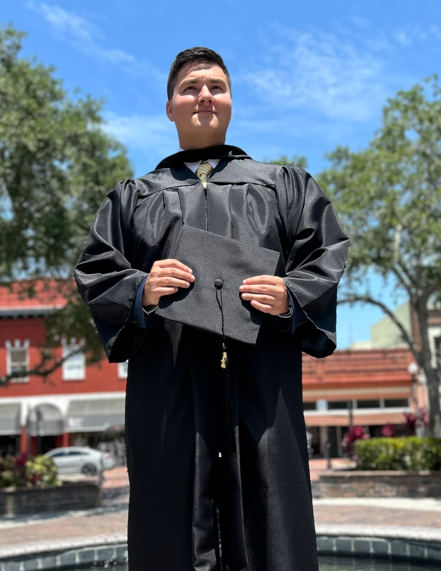
Ryan graduated from Beacon College as one of five valedictorians.
LEESBURG – Ryan Sleboda is a college graduate with a degree in anthrozoology, a 4.0 GPA, and the distinction of being one of five valedictorians for Beacon College’s Class of 2024.
He’s sailing off to a future where he expects to own a business – a doggy daycare – and live on his own.
“That’s my motivation,” he said.
These are significant milestones for Ryan, who is on the autism spectrum.
Socially shy for most of his life, Ryan, 23, has cleared hurdle after hurdle thanks in part to the Family Empowerment Scholarship for Students with Unique Abilities, managed by Step Up For Students. It enabled him to attend a private school that set him on his journey of success.
He graduated from Pace Brantley Preparatory School in 2020 as valedictorian and senior class president.
“One door opened to another door every time,” his mother, Susan said, “and it all started with that initial door, getting that scholarship.”
***
There was a time when the idea of Ryan attending college and living on campus was a concept his mother didn’t even dare to dream.
“We set our expectations low, honestly,” Susan said. “For a time, we thought Ryan would always live with us. But he’s come so far, and this college has been amazing for him.
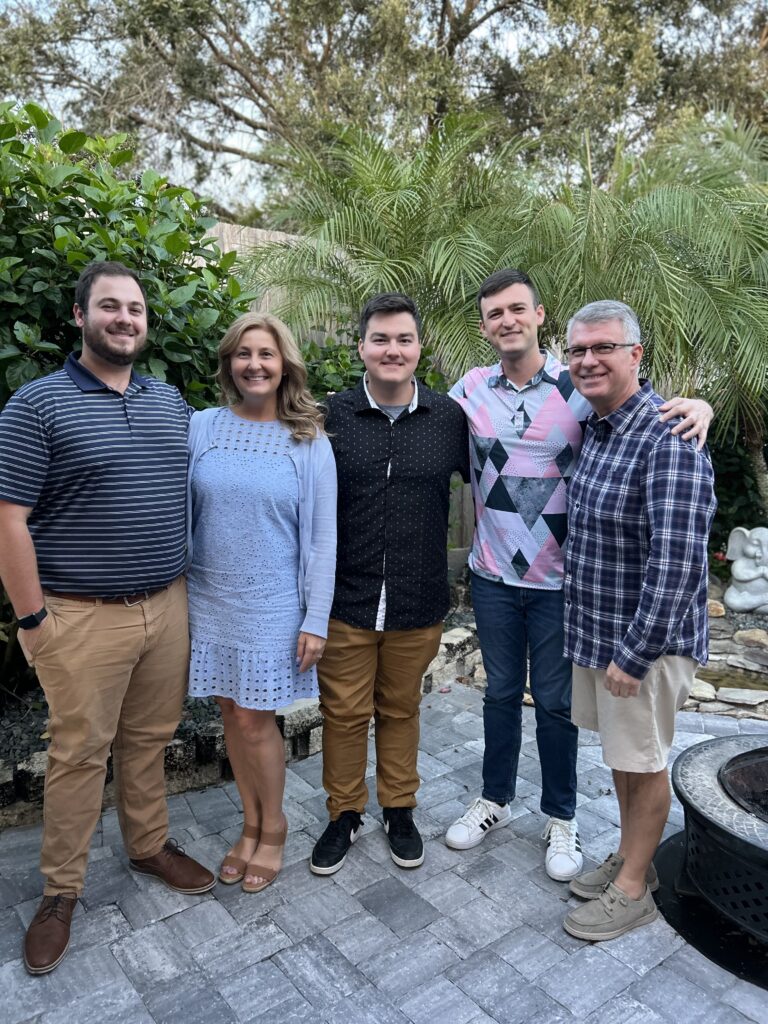
Family support played a great role in Ryan's success.
“Now, we're seeing a student who's graduated, who is not just further ahead than we had hoped but has blown away our expectations. He wants to own his own business. He wants to be an entrepreneur. What's better than that? He has truly exceeded our expectations.”
Beacon College is a four-year college in Leesburg. It was founded in 1989 for students with learning differences such as attention deficit hyperactivity disorder (ADHD), autism, and dyslexia.
Its small student body (455 undergraduates) allows for a teacher-student ratio of no more than 1 to 15 and creates a more nurturing learning environment. Its dorm rooms allow students to build the self-confidence that comes with living away from home while attending college.
“There are a number of things we want for our students, and one of them is to be independent, so when they leave, they can be self-sufficient,” said Beacon College Provost Dr. Shelly Chandler. “Of course, we want them to be educated. We want them to be lifelong learners. But the main thing is we want them to find meaningful work and live a fulfilling life.”
***
Two members of Beacon College campus security paused their conversation to greet Ryan as he walked past them on a sunny midweek morning. A trio of coeds did the same as they passed by.
From across the street, a classmate shouted, “Hey, Ryan!”
![]()
“If he were an athlete, he’d be an MVP,” said Bryan Cushing, a Beacon College professor who has taught Ryan since his freshman year.
Ryan returned each greeting with a cheery “Hello.”
“Attending Beacon College has made me an extrovert,” Ryan said.
“That's very true,” Susan said. “He used to be quiet. And I don't want to say afraid, but shy and timid. It was hard for him to make friends. He was afraid of making mistakes. Beacon College has truly turned him into a leader.”
Ryan excelled at Pace Brantley, but that was a familiar, comfortable setting. College would be different. There would be new teachers and classmates. Ryan would have a roommate.
Like his older brothers, Matthew (Florida Atlantic University) and Jason (Florida State University), Ryan wanted to go away to college. He wanted that independence. He researched the universities in Florida but couldn’t find one that would fit his needs.
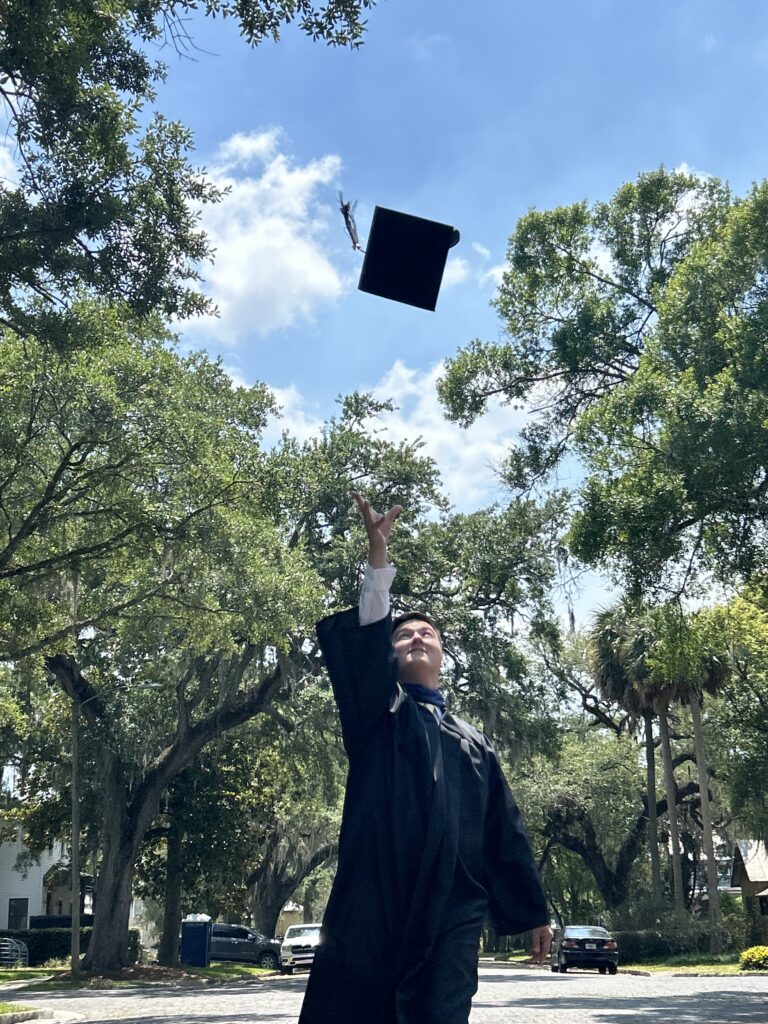
“They just don't have those best services provided for those with special needs,” Ryan said. “With me, I can't handle being in a big crowd as much because that's where my anxiety rises so much that I can't focus. And that's where my autism starts to overstimulate really crazy, even when it's in a school setting.”
Ryan learned of Beacon College when school president Dr. George J. Hagerty visited Pace Brantley during Ryan’s junior year. The school, located an hour from Sleboda’s home in Sanford, offers anthrozoology as one of its majors, and that appealed to Ryan’s love of animals.
The school also offered a three-week program called Summer for Success, where high school freshmen, sophomores and juniors live on campus and receive the full college experience.
Susan and her husband, Bill, didn’t know what to expect when they dropped Ryan off in Leesburg that summer. They were surprised at what they found when they returned three weeks later.
“Honestly,” Susan said, “I couldn’t believe he was the same person. He entered that Summer of Success program as a young boy, and when we picked him up, he was a young man.”
Ryan walked and talked with a self-confidence they had never seen in him. He was ready to go away to college.
“That's what a lot of families experience,” Chandler said. “And when they come in the first semester, boy, do we see growth. By the time they graduate, they're different people. They really are.”
***
Ryan’s four years at Beacon College weren’t all seashells and balloons. He learned roommates can be challenging. Keeping track of his class schedule and coursework took some getting used to. As did living away from home.
“I have to admit,” he said, “I was homesick at first.”
But he slowly escaped the cocoon he’d built around himself and began meeting daily challenges.
“He took a lot of risks on his own socially and academically to build that confidence,” Cushing said.
Ryan became a leader in the college’s orientation program and gravitated toward new students, eager to show them around and answer their questions.
As a junior, he traveled to Costa Rica to study the local ecology. He interned at a doggy daycare near his home before his senior year. That’s where he developed the idea of owning his own business.
Through all of it, the straight-A student in high school continued to earn top grades.
Cushing said watching Ryan develop during these past four years is why he teaches at Beacon College.
“So many other people would see our students and just dismiss them off the bat, and that's not fair because they all have an equal right to education, and they deserve to get this education and the experiences that come with going to college, the social stuff, the personal growth,” he said. “And if we can provide that, and they take advantage of it, it's really a beautiful thing.”
Tristan Drummond was born 10 weeks premature with one kidney and enough genetic disorders that doctors gave him a 50/50 chance to turn 1.
He had his first surgery when he was 2 days old and has far exceeded that dire prediction. He will turn 12 in June.
But his lungs are filled with scar tissue, and his left lung tends to collapse. He’s susceptible to colds that lead to pneumonia, and that leads to more scar tissue on his lungs.
Also, Tristan is on the autism spectrum.
“The cherry on top,” said his mom, Danielle.
Tristan is homeschooled and receives the state's Family Empowerment Scholarship for students with Unique Abilities. Unless he’s going to a doctor’s appointment or the grocery store with his mom, he spends nearly all his time inside the family’s home in Fort Lauderdale, Florida. Yet Tristan’s world virtually spans the globe.
“The scholarship has allowed him to actually have a life,” Danielle said. “It's hard for kids like him because they don't have a lot of outlets. They need those relationships with other kids, and that is a safe way for him to do it. He has friends that he plays with online.”
The scholarship operates as an Education Savings Account (ESA), which allows Tristan’s parents to spend its funds on curriculum and other approved education-related expenses. Art supplies have topped that list during this school year.
The ESA also allows for electronics, which have shaped Tristan’s education and enabled him to have a social circle of about 50 friends whom he’s never met physically yet plays with nearly every day.
Tristan was born with VACTERL, which stands for vertebral defects, anal atresia, cardiac defects, tracheo-esophageal fistula, renal anomalies, and limb abnormalities. Not everyone with VACTERL has all six conditions. Tristan has three.
“It's a nice little combo of rare diseases that just sort of all landed on one kid,” Danielle said.
He was born without a section of his esophagus and a tethered spinal cord.
“He had eight surgeries before his fifth birthday and so many procedures I’ve lost count,” Danielle said.
Tristan had back surgery when he was 6 to correct his spinal cord. That’s when Danielle and her husband, Ashley, used the ESA for a large-screen TV and virtual reality equipment to help Tristan relearn how to walk. They quickly realized the benefits the ESA could have on Tristan’s life.
Virtual reality has been used for nearly 25 years to help people on the autism spectrum learn to communicate and develop job skills. It has helped Tristan improve his cognitive and gross motor skills through occupational and physical therapy. It helped him increase his attention span and developed his hand-eye coordination and core strength. He’s learned how to count and how to exercise.
It has also taken him around the world.
Tristan landed on the moon with the Apollo 11 crew, swam with sharks off the Great Barrier Reef in Australia, and visited Epcot Center and the Smithsonian Institute in Washington, D.C.
He’s studied astrophysics and Van Gough and knows everything about the tardigrade, an eight-legged micro-animal that lives in water.
The online game Roblox makes Tristan aware of how his body moves because it tracks a player’s body, eye, and facial expressions. He learned to work with teammates by playing the video game Beat Saber. Gorilla Tag allows Tristan to play tag with his friends, something he could never do in the real world without the risk of getting sick.
Tristan had trouble sleeping at night until Danielle came across Liminal VR, which stimulates different parts of the brain.
“He does his five minutes on there, takes his bath, then he goes to sleep and doesn't have a problem,” Danielle said.
With Minecraft, Tristan has built an entire neighborhood, complete with houses and people living in those houses. He makes videos with his Stickbots and Godzilla figurines.
Everything is relevant to her son’s education, Danielle said. Tristan is learning to code and make videos. He’s learning science and math. Some might see it as unorthodox.
“But he doesn’t fit in a box,” Danielle said.
Tristan responds to electronics. To not have that would be a lost opportunity when it comes to his education.
“This is where it changes into something that can be usable for a career later,” Danielle said. “For kids like Tristan, technology is going to be where their careers, if they have them, are going to be because they have an aptitude for it.
“You hope for him to have a productive life and hopefully be a contributing member of society, and the future of our society is electronic.”
NAPLES – Payton Gibbs stood at midfield wearing black pants, a red pullover, and a red ballcap emblazoned with the University of Massachusetts logo. From a distance, she looked like a football coach watching her team during pregame warmups.
From closeup, too, because on a brisk November afternoon in Amherst, Massachusetts, the 12-year-old from Naples served as an honorary coach for the Minutemen.
Payton and her family were guests of Coach Don Brown, who is a friend of the family.
“Coach Brown said he was going to put her to work, and he did,” said Payton’s dad, PJ, the defensive coordinator at Golden Gate High School in Naples.
Payton attended the pregame meetings and dined with the players during the pregame meal. She was in the locker room before Brown sent the team on the field and again at halftime. During the game, Payton walked the sideline with a graduate assistant coach and charted the defensive plays.
“It was a great experience,” she said.
Payton, who is on the autism spectrum and receives the Family Empowerment Scholarship for Students with Unique Abilities (FES-EO) managed by Step Up For Students, wants to be a football coach. She wants to break down video of games and practices and devise game plans. On game day, she wants to wear headsets and signal in plays from the sidelines.
And, just like her dad, Payton wants to coach defense.
“Defense wins championships,” she said.
Payton uses her FES-UA scholarship to attend Royal Palm Academy Catholic School, where she is a sixth-grader. She impresses her teachers with her hard work in the classroom, her painstaking attention to detail on assignments and her upbeat personality.
Also, her football IQ.
“How many 12-year-olds can you talk to about a zero zone defense?” asked Andre Ghelman, one of Payton’s teachers. “Her knowledge of the game is outstanding.”
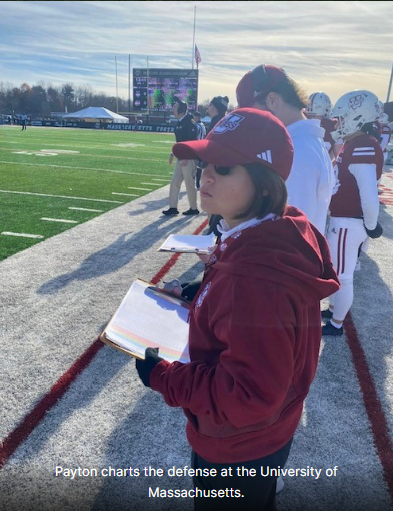
Payton has thrived academically since she began attending Royal Palm Academy as a fifth-grader. She is an honor roll student who was named the Santa King of December by her math teacher for being the only kid in class to get a 100 on a test.
PJ and his wife, Kristen, toured the school before the 2022-23 school year and knew it was the right academic fit for their daughter.
“The main reason was the small class sizes and that they pray and salute the flag every morning,” Kristen said. “The scholarship has been amazing. Thank goodness. I have to say the state of Florida has done wonders for us. It really has.”
PJ has coached football for 24 years, and for the last seven his daughter has been his shadow on the football field. Payton attended practices and reviewed the game film with her dad. She began the past season charting Golden Gate’s defense from the sideline until officials at the Collier County Public School district, citing a number of reasons including safety, banned her from the sidelines.
“I almost cried tears when I heard I couldn’t be on the sideline,” Payton said.
“That’s the only time I ever saw her unhappy,” Ghelman said.
Payton’s family tried to have the ban lifted to no avail. Payton’s mom said the family will continue to try to have the ruling overturned.
“We don’t want to stop, not just for Payton, but because there’s going to be another student who wants to coach,” Kristen said. “We want them to have the same opportunity.”
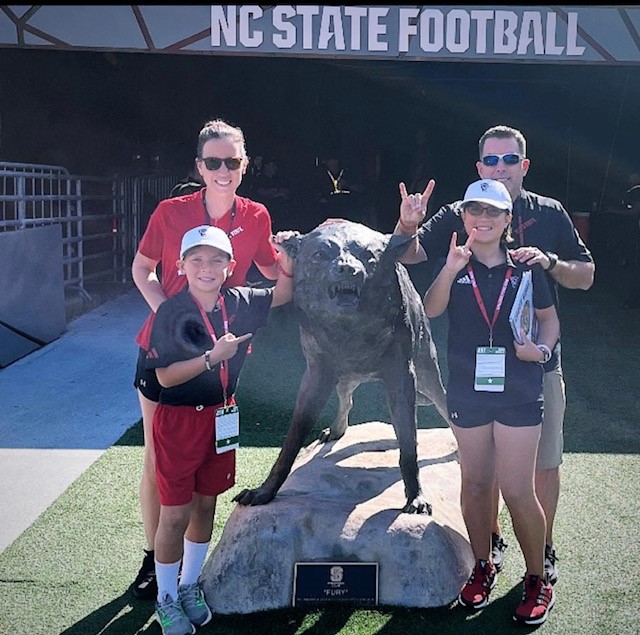
Payton’s plight gained attention from TV stations in Southwest Florida. It reached North Carolina, where North Carolina State University football coach Dave Doeren took note. PJ knows Doeren through coaching circles.
Last October, Doeren invited the Gibbs to attend a game against Clemson University. Payton was treated like part of the coaching staff, though she did not help chart the game. She participated in the pregame coin toss as an honorary captain and watched, along with nearly 57,000 fans, as the Wolfpack won 24-17 on a postcard-perfect autumn afternoon.
“It was actually very, very great,” Payton said.
Doeren has a son who is on the autism spectrum. Last year, Doeren and his wife, Sara, established OnePack Empowered, for NC State students who are neurodivergent or have executive functioning challenges.
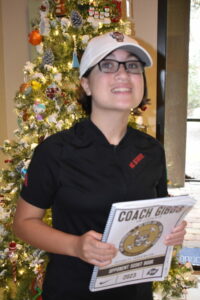
We shouldn’t be putting roadblocks up for young people that want things, that are good people, that are doing things the right way. It’s just wrong. And so for me to have an opportunity to help her – not just her but people like her – that’s what this was about,” Doeren later told reporters.
The number of females on college and NFL coaching staffs is growing. One survey estimates that 8% of college coaches in 2023 were female. There were nine female assistant coaches in the NFL this past season. The Tampa Bay Buccaneers had two females on the coaching staff when they won Super Bowl 55.
Payton has Skyped with Kathleen Wood, who scouts college football players in the Northeast for the Cleveland Browns.
So, opportunities are growing for girls like Payton who aspire to a career in football, and not only as coaches. Front office, scouting, and analytical jobs are now being filled by women.
“Everything that we do today should be about preparing our kids for their future,” Kristen said. “Payton has such a passion for football. She’s so into the game and so focused. She has the drive. She’s a hard worker. I will not be surprised if one day she’s a coach. She’s falling into daddy’s footsteps.”
Traditional school wasn’t working for Alexander Luther. The 15-year-old, who has autism spectrum disorder, would get overstimulated and tired toward the end of the 6-hour day. His mother, Sue, a former teacher who had homeschooled her son during the pandemic, knew some well-timed breaks would help him maintain focus so he could learn the life skills he would most need as an adult.
So, Luther designed a home learning plan for him that combined lessons in core subjects with practical skills such as counting money, budgeting, housekeeping, and staying healthy.
“The goal is for him to be as independent as possible,” she said.
Luther, a former military spouse and single mom from Largo, Florida, stopped using Alexander’s Family Empowerment Scholarship for students with Unique Abilities to pay private school tuition and started using it to buy the supplies necessary for him to learn at home.
Florida lawmakers passed the Unique Abilities scholarship program in 2014. Formerly known as the Gardiner Scholarship, it provides an education savings account that functions like a restricted-use bank account from which parents direct funds to pay for private school tuition and fees, approved homeschooling expenses, therapies, tutoring and other education-related expenses.
Luther used some of Alexander’s funds to buy a virtual reality headset for physical education. He uses it to play Beat Saber, a rhythm game where players slash colorful cubes with virtual swords as they fly toward them to the beat of fast-paced music. Luther says the game not only provides physical activity but helps prime Alexander’s mind for learning. Small-scale research has suggested that so-called exergaming, which combines virtual reality games and physical exercise, can help younger users improve their performance at specific cognitive tasks.
“VR has come a long way,” said Luther, who used personal funds to buy herself a headset to play Beat Saber and other exergames. “It’s a great workout, and we can do it together. It’s such a great tool. It’s going to be in a lot of schools someday.”
The VR activities also allow him to learn social skills.
“He’s got to learn how to take turns and how to interact with others,” Luther said. “It gives him the space he needs. Nobody’s touching him.”
Luther bought Alexander’s laptop and headset through MyScholarShop, an online purchasing platform for families who have an education savings account. The portal lets parents buy pre-approved instructional materials and curricula without having to pay out of pocket.
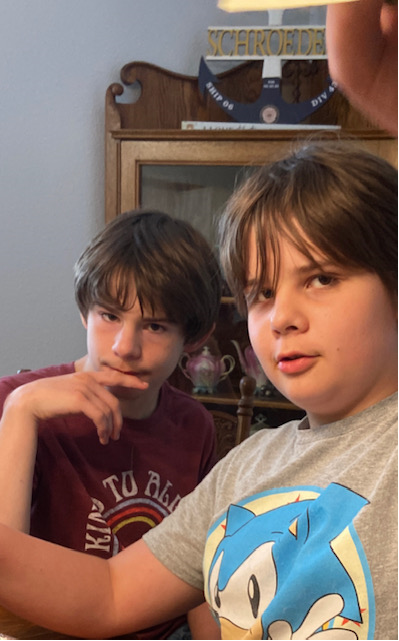
Alexander Luther, left, with younger brother, Miles
A typical homeschool day begins with breakfast after dropping off Alexander’s younger brother, Miles, 13, off at a charter school.
Alexander helps make the toast and jelly and puts away his dishes after he eats. The activity is not only for nourishment but also to teach Alexander the life skills needed to live as independently as possible as an adult.
Next is handwriting practice, followed by instruction on the laptop. Then he takes a break before lunch, when he helps Luther prepare the meal and clean up afterward.
Alexander spends the afternoon on math followed by science, which typically involves projects such as making a lava lamp or growing a plant.
The last part of the day includes Beat Saber or yoga and then winds down with an art project before it’s time to pick up Alexander’s brother from school.
Alexander uses his laptop for learning games and puzzles on ABC Mouse and Starfall sites and for video games that Luther offers as rewards for staying on task and achieving goals.
In the evenings, a therapist certified in applied behavioral analysis comes to the house to help Alexander with self-care skills such as showering. The family’s insurance covers the therapy sessions, but for other families, therapy provided by a certified behavioral analyst is an eligible scholarship expense.
This year, Luther has seen Alexander make progress in math and counting. She uses play money to help teach him addition and subtraction and how that works in real life scenarios. He recently began receiving government disability payments, making money management an even more important skill. Sometimes they dine out so Alexander can practice personal finance skills by recording transactions on Cash App.
The app gives him a place to keep the money he earns from doing simple household chores such as putting away his laundry and cleaning his room.
“If he wants a hamburger or a video game, he can use the app to buy it,” Luther said. The app also keeps a history of transactions so Alexander can evaluate his spending choices and improve his decision-making skills. “I want him to know so no one can take advantage of him,” she said. “I want him to be able to figure out “Did I spend this or did someone take it from me?’ I know he’s never going to be able to be on his own completely, but he needs to be aware.”
Luther said he also has improved his handwriting as well as his patience and focus.
“Getting him just to do that has been a huge improvement,” she said.
Luther said she sees a need for more programs to serve teenagers who can’t go to college or technical school but who need training in job and life skills.
“That’s the school I always wanted to start – how to survive in the world if they don’t want to go to college. We would have fewer dropouts. That’s part of the whole school choice thing, isn’t it?”

Lilly Bowden of Plant City, who is homeschooled by her mother, Debbie, receives funding for school supplies, including a computer and printer, books, a telescope and a microscope, through Florida’s Family Empowerment Scholarship for Students with Unique Abilities.
PLANT CITY – Lilly Bowden flipped through her sketch pad and proudly showed off her work. There’s a fox on one page and a cat on another. A giraffe from the neck up and a mountain range in all its purple majesty.
One drawing begins on one side of a page and ends on the other, forming a U-shape. A snake? An eel?
“I have no idea what that is,” Lilly said.
More pages, more drawings. An armadillo. A seahorse. A seashell. A leaf. One page has a pineapple, a watermelon, and some grapes.
“It’s a still life,” Lilly said. “Kind of abstract.”
Lilly, 12, wants to be an artist, and she’s taking her first steps with the “Drawing Lessons for Beginners” DVD purchased with her education savings account that comes with the Family Empowerment Scholarship for Students with Unique Abilities. Managed by Step Up For Students, (which hosts this blog) the ESA gives parents the ability to customize their child’s educational needs.
The money can be used for curriculum and education materials, therapies and medical specialists, tutors, and tuition to private schools.
“The scholarship has been such a blessing for us,” said Debbie Bowden, Lilly’s grandmother and legal guardian.
Lilly was born with pulmonary atresia with ventricular septal defect, a congenital heart disease that left her with one working ventricle. She’s had three reconstructive heart surgeries, one each year for three years beginning when she was 1.
When she was 5, a blood clot led to a stroke, which led to the diminished use of her right arm and hand.
She has a pacemaker. She has scoliosis and wears a back brace 20 hours a day. She has several allergies.
Because of Lily’s weakened heart, a minor cold can turn into pneumonia and land her in a hospital for two weeks. A growth spurt could place too much stress on her heart and prove deadly, Debbie said.
“With Lilly, we take it one day at a time. For everything that’s she’s got, she’s still a fighter. She’s lived a lot longer than they ever thought she would,” Debbie said.
To continue reading, click here.